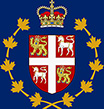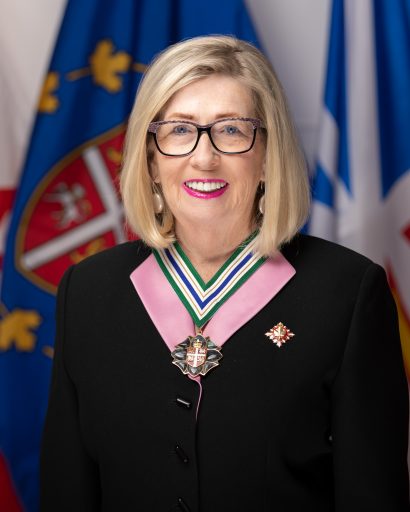There is specific, proscribed protocol associated with public appearances of the Lieutenant Governor at events and receptions. This information should provide adequate guidance for most scenarios however, when in doubt, always contact the Office of the Lieutenant Governor for clarification and/or guidance at (709) 729-4738.
Entrance Protocol
For any formal procession into a function, the Lieutenant Governor and accompanying guests (the vice-regal party) enter the hall or room last. The group is preceded by an Aide-de-Camp. At smaller,or less formal dinners, changes may be acceptable, however the Lieutenant Governor should always be the last to arrive. Any changes to an event must be approved by the Event Manager.
Once the guests and head table/other dignitaries have entered the function, all attendees will be requested to rise, and the entrance of the Lieutenant Governor should be announced. It is appropriate for the chairperson or master of ceremonies to make a simple announcement such as: “Ladies and Gentlemen, please rise for the entrance of The Honourable Joan Marie Aylward, Lieutenant Governor of Newfoundland and Labrador and (if accompanying), His Honour The Honourable Carl Thompson.”
The Lieutenant Governor then enters the room where the event is being held. The emcee will announce the arrival of the Lieutenant Governor by saying: “Her Honour The Honourable Joan Marie Aylward, Lieutenant Governor of Newfoundland and Labrador” and (if accompanying), “His Honour The Honourable Carl Thompson.”
Royal Salute
During events, and once the Lieutenant Governor is announced and reaches her seat, the Aide-de-Camp will signal the orchestra/pianist/organist to commence playing the Royal Salute.
The Royal Salute – formerly known as the Vice-Regal Salute – is comprised of the first six bars of ‘God Save the King’ and the first four and last four bars of ‘O Canada’ played without a break between the two anthems.
Afterwards, all guests can be seated unless the emcee has instructed them to remain standing for Grace or the national anthems. The Lieutenant Governor should be informed beforehand if Grace is to be said and by whom.
Arriving at a Reception
When a reception is held prior to an event, the Lieutenant Governor will arrive 20-30 minutes before. For example, if a reception begins at 6:00 pm, with dinner served at 7:00 pm, the Lieutenant Governor will arrive between 6:30-6:40 pm. There are some exceptions to this timing, notably:
- If a receiving line is scheduled for 6:30 pm, the Lieutenant Governor will arrive between 6:15-6:20 pm;
- When attending a choral, theatrical, or other performance, the Lieutenant Governor will arrive approximately 10 minutes prior to the start;
- For church services, the Lieutenant Governor will arrive 10 minutes before the service commences.
Host Greeting
The host will meet the Lieutenant Governor at the door of the building. Arrangements should have already been made for outerwear to be taken to a secure location
When the venue for a function is in a hotel, the Lieutenant Governor should also be met by the manager or duty manager. An elevator, if required, should be held and the manager or duty manager should accompany the Lieutenant Governor to and from the function. The Aide-de-Camp will advise the hotel of the arrival time.
While the Lieutenant Governor will know the name of the host, it is the duty of the Aide-de-Camp to introduce them. It is also customary to ensure the Lieutenant Governor knows the names of all principals for the function.
Meeting Dignitaries
The Lieutenant Governor will be escorted into a reception room to meet special guests or dignitaries. The process of meeting special guests and dignitaries can be accomplished one of two ways: a receiving line; or, by the Lieutenant Governor moving down a line of guests.
For receiving lines, the Aide-de-Camp will present the guest to the Lieutenant Governor. The guest then moves down to meet the host and other dignitaries in line.
The preferred approach is to have the Aide-de-Camp present special guests and dignitaries to the Lieutenant Governor. These should be lined up in an orderly fashion to permit a smooth flow of presentations by the Aide-de-Camp down the line.
The normal etiquette during introductions is to shake hands. No nodding of heads, bowing or curtseying is required.
If there is time between the reception and a meal, the Lieutenant Governor will normally circulate among guests. The host should remain with the Lieutenant Governor to assist with introductions and provide information, if necessary.
To avoid confusion when making introductions, it is best to use the phrase: “Your Honour, may I present _________________.” If the host or Aide-de-Camp brings forward another guest, this is a signal to the person speaking with the Lieutenant Governor that their conversation is at an end.
Seating
As a rule, the Lieutenant Governor sits to the right of the host, regardless of whether there is a guest speaker or other distinguished guest. The Lieutenant Governor does, of course, yield precedence to the Sovereign, a visiting head of a foreign state, or the Governor General.
The Aide-de-Camp will check seating arrangements upon arriving at a function to ensure there have been no changes, and will brief the Lieutenant Governor on the guests who will be seated at the head table.
Head table introductions are typically made by the host and should be made from the furthest guest on the left of the host, to the centre, then from the furthest guest on the right of the host, to the centre. The Lieutenant Governor is the first to be introduced.
The Aide-de-Camp does not sit at the head table, but should be seated in close proximity for easy eye contact with the Lieutenant Governor, and to be of immediate service, as required.



